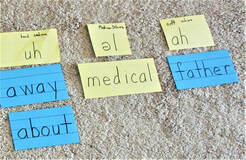As I have mentioned earlier in earlier blog posts, a big problem with phonics is that the rules have so many exceptions the children get confused. Confusion leads to reading failure. Let’s look at an example. One seemingly popular phonics internet site says: “a in ago should say long a for an open syllable, but it is a schwa.”
Yes, letter a is using the schwa sound, but the reasoning in this statement is wrong. There are words that start with the letter a that use the long a vowel sound: able, acorn, apron—just to list a few. There are also words that start with the letter a that do not use the long a vowel sound: ago, among, around, away—again just to mention a few. Regardless of the phonics rule, the word ago does not use the long a vowel sound, and there is absolutely no reason to assume that it should. There are plenty of words that start with the letter a that do not use the long a vowel sound. So, why would a phonics educator think that the word ago would use a long a vowel sound?
Because they do not understand the rules that they are trying to teach and because the phonics rules are not consistent. This is why it doesn’t work to try and rely on phonics rules.
Some researchers have counted the number of times phonics rules do not work and have found phonics rules are accurate only 60% of the time. What should children do the other 40% of the time? [Check my blog post from 10-26-19 for more data showing how unreliable phonics rules are.]
When the phonics rules have all of these exceptions, it is easy to see how even teachers and resource writers can get confused. You must be careful when taking worksheets, informational videos, or any other information off the internet--even if you are paying for it. Just because someone charges a fee, doesn’t mean the material that they are selling you is accurate. Don’t teach mistakes or incorrect information. Inaccurate information also leads to reading failure.
I’ve worked with many students at my reading clinic who were sent to me because they were failing in reading, when their only problem was that they had been taught incorrectly. They had memorized phonics rules, but the rules were inconsistent. Therefore, they had become confused. Confusion leads to failure.
Look in a dictionary or use the dictionary on your computer. Check to make sure that what you are purchasing or even using for free is accurate.

Caption: There are actually 7 different sounds for the letter a. The schwa sound is not an exception; it is just one of the 7 sounds.
Here is a second example of a phonics problem:
“When a word ends in /stle/ the /t/ is silent and you only hear the /l/.”
Wrong again. Yes, the letter t is silent, but, if you check the dictionary, the sound you hear is not just a single consonant l sound. The example given on the handout is for the word castle. The word castle does not end with a single consonant letter l sound. Again, check the dictionary. The dictionary prints the pronunciation of castle as: kasəl. There is a difference between a single l consonant sound and the əl sound. Once again, the phonics rules and exceptions are so complicated and confusing that even the people who teach phonics can have trouble understanding them. That is why vowel clustering, which I use in my programs, is much more effective.
I will now get back to work on a good list of free teaching resources.
 RSS Feed
RSS Feed
